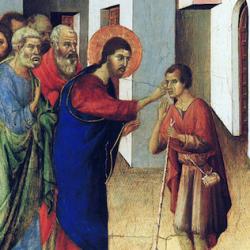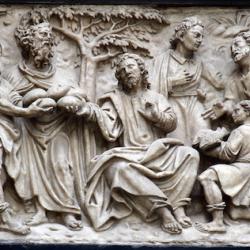Judith Gundry’s contribution to The Child in the Bible examines the place of children in Mark’s gospel, with particular focus on the episode of Jesus blessing the children. It’s an illuminating essay.
Mark includes no infancy narratives, but regularly shows Jesus exerting the power of the kingdom to rescue and save children: “Jesus performs miracles for children: he raises Jairus’s twelve-year-old daughter from the dead (Mark 5:22-24, 35-43); he exorcizes an evil spirit from the Syrophoenician woman’s young daughter (Mark 7:25-30); he casts out a demon causing deafness and muteness from a man’s young son (presumably an epileptic, Mark 9:17-29). Jesus hugs a little child to demonstrate for his disciples how to be great in God’s kingdom, and he equates their receiving a little child into their care in his name with receiving Jesus himself (Mark 9:33-37). People bring little children to Jesus, and he teaches that they are intended recipients of God’s kingdom and examples of entering it, which he demonstrates by hugging them, laying his hands on them, and blessing them (Mark 10:13-16).”
The last of these passages brings Jesus’ ministry to a climax, and also clarifies the relationship between “Jesus’ teaching about little children and the kingdom of God and Jesus’ ministry to children.”
The parents bring children to Jesus to tough them. Jesus’ touch is a healing touch, the royal touch of the Son of God, but Jesus doesn’t do any miracles for the children. Instead, he hugs them, lays hands, and blesses.
Citing an essay by the incomparable JM Duncan Derrett, Gundry notes the link between Jesus’ blessing of the children and Jacob’s blessing of his grandsons Ephraim and Manasseh. Duncan Derrett takes the latter scene as an adoption, and suggests that Jesus’ gesture of blessing is also adoptive.
Gundry finds the argument convincing: “Jesus’ hug . . . can be seen as an adoptive embrace, an assumption of a parental role. His subsequent blessing indicates that he has adopted the children in order to pass on an inheritance to them before he dies, and in this way ‘save’ them.”
This context helps us grasp what qualifies children to receive the kingdom. Gundry argues that it is not any quality of virtue in the children, but the sheer fact of their need. Insofar as Jesus comes to give the kingdom to the poorest and least, children are model subjects of the kingdom. In contrast to Jewish thinkers who claimed that Torah-keepers were qualified for entrance into the kingdom, Jesus claims that children, too young to distinguish good and evil, are the ideal heirs. They receive the kingdom, and are received into it, “apart from the works of the law” (in both the old and new perspective senses of the phrase).
As Gundry summarizes the point: “Little children were the weakest and most vulnerable link in the social chain and therefore in many and profound ways dependent on God’s rule being implemented in their lives. If Jesus’ ministry has demonstrated so far that the kingdom of God is for those who are needy because they are needy and dependent on God, then clearly it belongs to little children.”
Jesus is in continuity with the prophets, who denounce Jewish pride and remind Israel that she was an infant foundling, kicking in the blood of her afterbirth, when Yahweh had compassion on her (Ezekiel 16). Jesus echoes “)ld Testament traditions in which Israel is depicted as the smallest, as an infant or a child, at the point when God elected and redeemed the nation. Israel was the littlest of all peoples, so God’s election and redemption can only spring from God’s love (Deut. 7:7-8).”
Why do the disciples try to prevent parents from bringing the children, especially when they have witnessed Jesus ministering to children and have themselves shared in that ministry? Gundry explains by calling attention to the charged atmosphere in which this episode takes place. With Jesus’ entry into Jerusalem, the disciples are filled with the expectation of an imminent kingdom, a kingdom in which Jesus will conquer and reign. Just here, Jesus shows them that God has chosen the weak and foolish things of the world to confound the wise and strong.
Gundry write, “Mark presents the disciples’ rebuke of those bringing little children to Jesus – ironically, at the very culmination of his ministry to children in Mark – as based on a now heightened expectation of the completion of Jesus’ mission, however badly misunderstood by them, and preoccupation with their own rank as Jesus’ closest associates.” Jesus’ stern rebuke to the disciples is a “repudiation and defeat of the attempt to hijack his true mission: to bestow the blessings of God’s kingdom on children and the childlike.”
Children are objectively needy and dependent. Adults have to become childlike. But that is what Jesus demands: He not only receives children, but calls the adults to be like the children he receives. Children are simply “the poor.” Adults must repent of our adult confidence to become “poor in spirit.”












